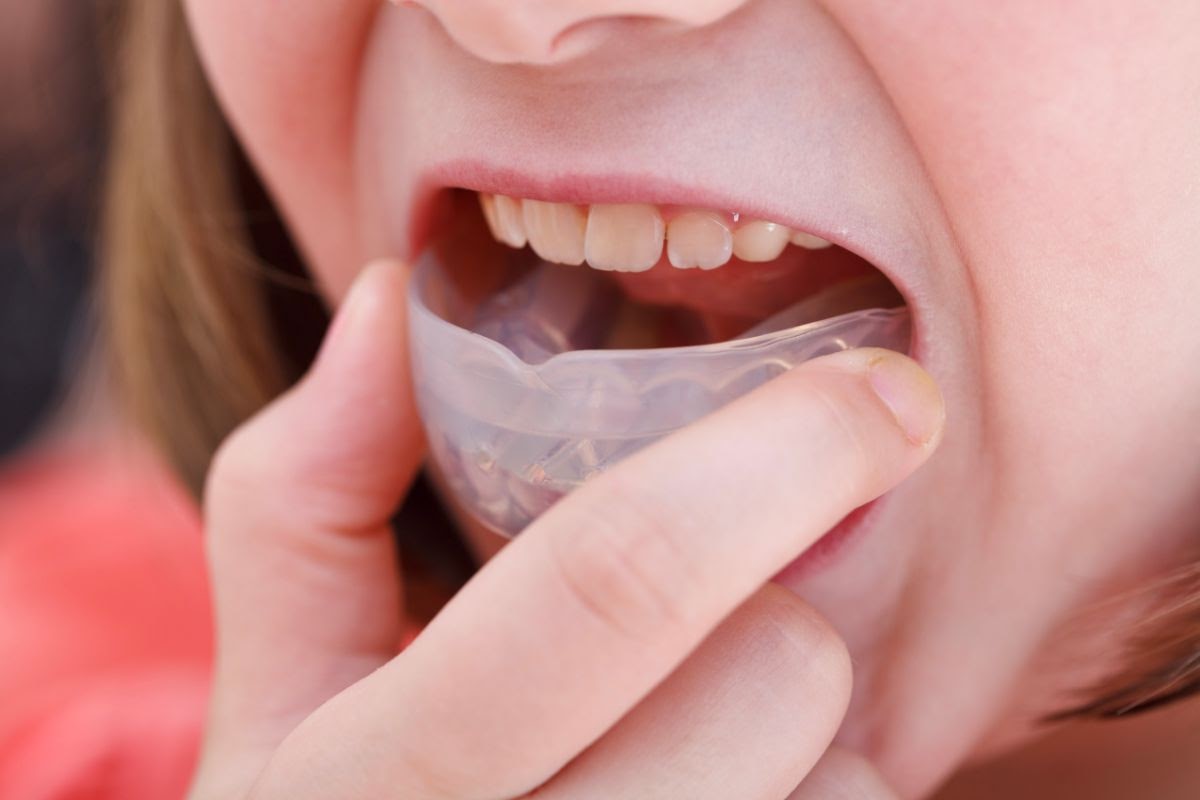Many of our Pioneer Orthodontics patients are involved in sports and have some questions about playing sports in braces. They’re often worried that they’ll have to miss out on a season or during their orthodontic treatment. The good news is that athletes at any level can continue to play any sport they love while wearing braces, as long as they take the necessary precautions.
We recommend sports mouthguards for our athletic patients. Mouthguards are the best way to keep mouths, teeth, and braces protected while in action on the court or field! Some patients prefer to use a regular mouthguard, which also provides some measure of protection. Keep reading to learn more about the differences between the different options and what that means for your smile.
Regular mouthguard vs. orthodontic mouthguard
Mouthguards are the easiest and most effective method for protecting your smile from while playing any sport. We recommend using a mouthguard for any sport, whether you play a light-contact sport like baseball or volleyball, or a high contact sport like football, hockey, or basketball.
While both regular and orthodontic mouthguards protect your mouth when you’re playing sports with braces, there are a few differences you need to know about. Standard mouthguards are thermoplastic, which means they are designed to heat up in the mouth and then mold around the teeth. If you wear braces, the material will mold around the brackets, which can be an issue for a few reasons. If the molding fits too well around the brackets, the force of a blow can potentially knock the brackets right off the teeth, leading to a longer treatment time and extra visits to our office.
Additionally, this kind of molding does not allow for the teeth’ movement, which is what orthodontic treatment is working to achieve! A non-orthodontic mouthguard can work against the patient’s orthodontic progress in this way. These mouthguards will also need to be replaced more often to keep up with the way your teeth shift during treatment.
Orthodontic mouthguards are made differently. The material is a high-grade silicone that cushions the lips from bumping and rubbing against the teeth. This is an essential feature since it can be extremely painful for patients to get a lip caught up in a bracket during a blow or a fall. This can cause swelling, and you may even need orthodontic help to release it!
Orthodontic mouthguards are built with this in mind. They protect the brackets on the teeth and soften any hit they take. To make room for your braces, they’re slightly larger than regular mouthguards. However, they are just as comfortable to wear.
There are mouthguards explicitly made for athletes in braces available online and over-the-counter in some sporting goods stores, such as the ShockDoctor, Gladiator, and Vettex brands. While these are a bit pricier than regular mouthguards, it is worth the extra cost for comfort and protection. While nothing can beat a customized orthodontic mouthguard, we recommend these over the standard mouthguards and a regular mouthguard over nothing!
Over-the-counter mouthguards
Shock Doctor
One of the most well-known brands, Shock Doctor mouthguards, are some of the best orthodontics mouthguards. Because they’re made of 100% medical grade silicone and designed to conform to the upper brackets, they’re more comfortable than other options and help reduce or eliminate cuts and scrapes. Shock Doctor mouthguards adjust to your teeth’ movement during treatment. Plus, both strapped and unstrapped styles are affordable.
Vettex
If you’re in braces and regularly play sports, mouthguards with a lip guard are a huge plus. Lip guards will keep you from accidentally biting yourself, but still, allow you to speak clearly. Vettex mouthguards contain lip guards, and while this makes them a little bulkier, they’re still an inexpensive, lightweight option. However, they have a more generalized design and aren’t made specifically for athletes in braces.
Tapout
Tapout mouthguards are a newer, more diverse style with a distinct design promoting airflow. The comfortable fit makes them easy to talk with, and they can re-mold to your teeth multiple times as they change. Because they’re meant to adjust based on your current bite, athletes undergoing orthodontic treatment can use them and those without any orthodontic appliances.
When should mouthguards be worn?
For patients in braces who play a contact sport, a mouthguard should be worn at all times. That includes warming up, during practice, and throughout the game. Injuries don’t always wait for the show-stopping plays. Something as simple as dumping into someone on the way to the field can put you in an uncomfortable situation.
How to care for an orthodontic mouthguard
It is essential to care for orthodontic mouthguards properly so that they last. Bacteria can quickly grow on mouthguards, so they should be cleaned every time they are taken out. We recommend using a soft toothbrush and toothpaste to clean the inner and outer surface gently. An antimicrobial solution may be used as a bacteria-killing rinse. For deep cleaning, the mouthguard can be left to soak overnight in a glass of water with a denture cleaner tablet. Mouthguards should always be kept in a case when they are not in use.
Pioneer Orthodontics are invested in keeping smiles safe
While mouthguards are the best way to ensure teeth stay safe even when participating in a sport that can potentially cause injury, we understand that damage can still occur. If a patient sustains damage to their mouth, teeth, or braces, we recommend calling our office as soon as possible to assess the situation and figure out the next step.
At Pioneer Orthodontics, we do all we can to help our patients in braces continue their normal activities, including athletics. We hope we’ve put your mind at ease and that you’re as excited as ever about your next big game. Our team would be happy to answer any questions you may still have about playing sports with braces. If you’re ready to put in the work on the field and on your smile, call us today to schedule a free consultation.


